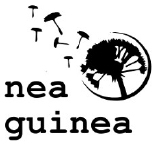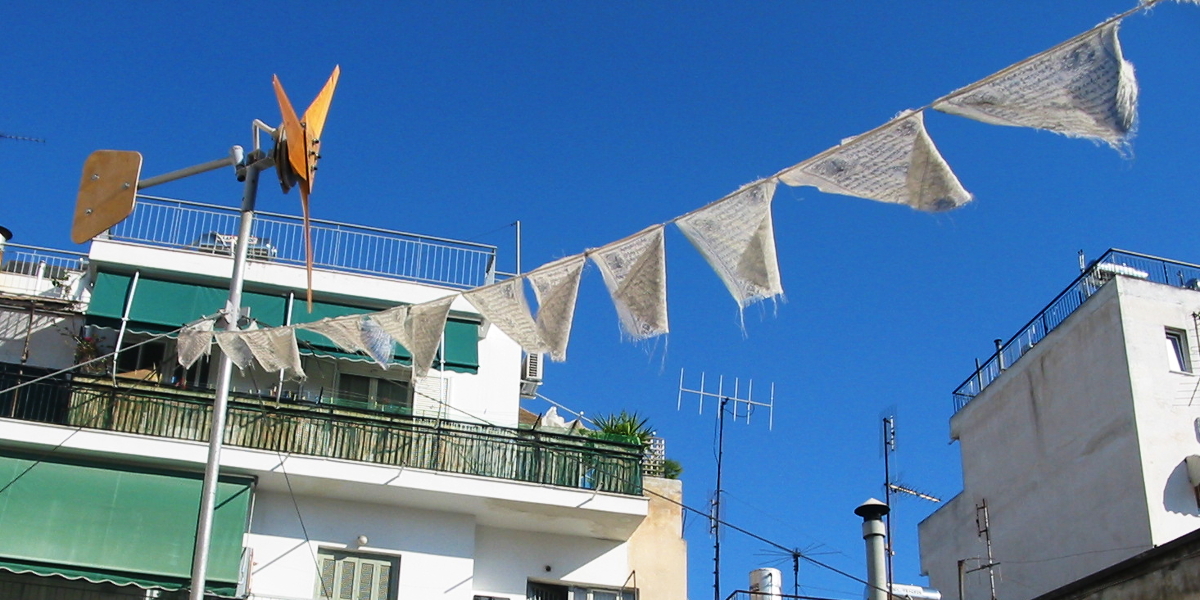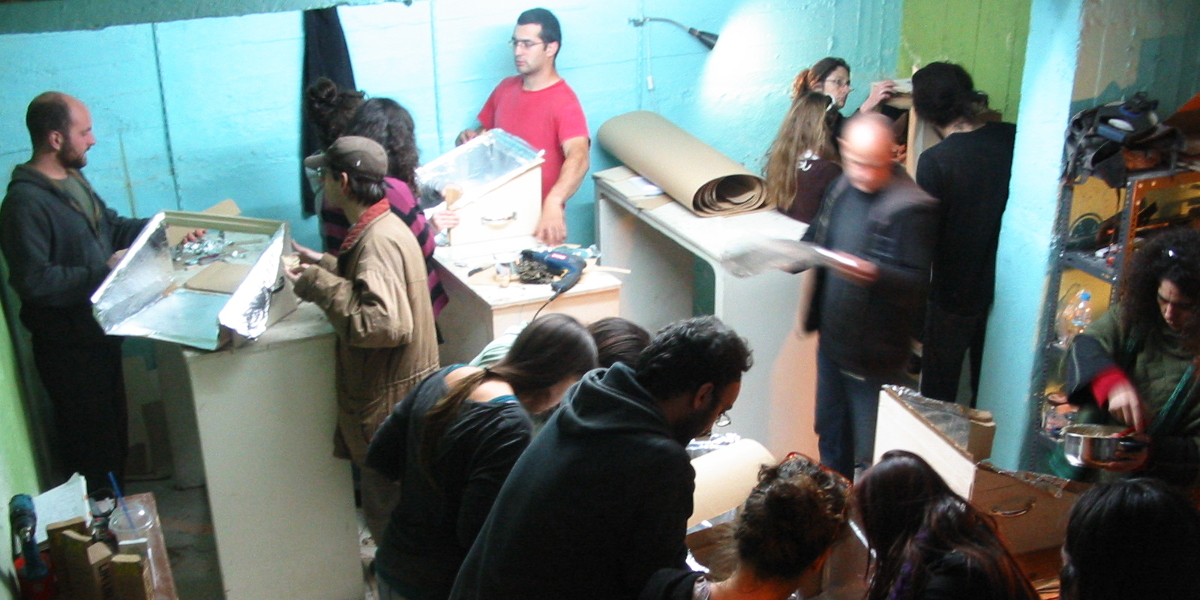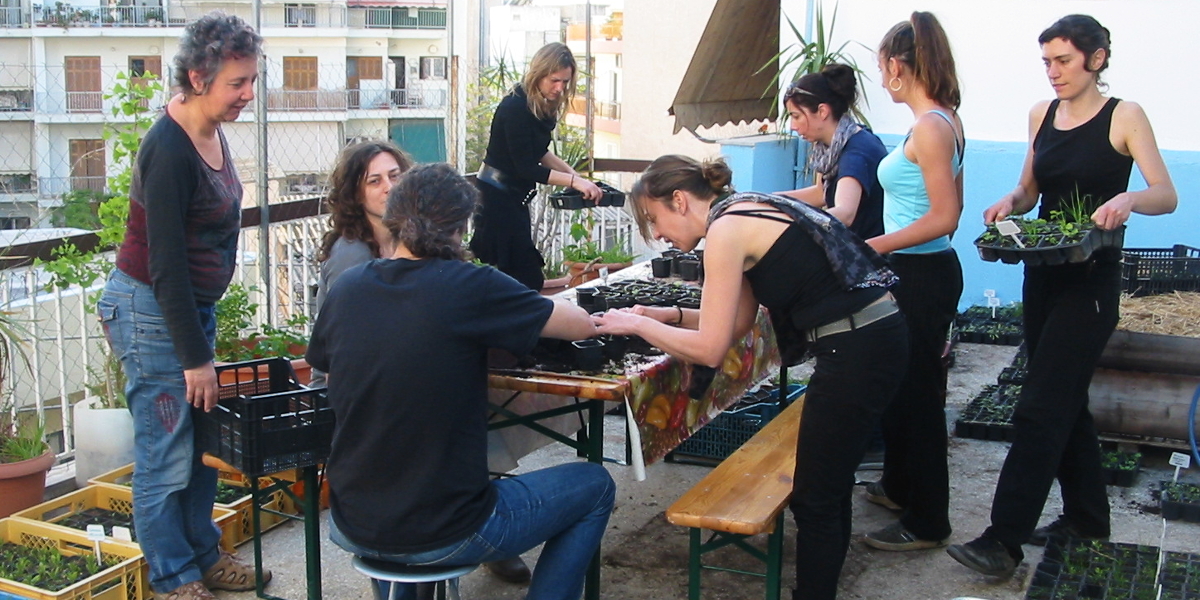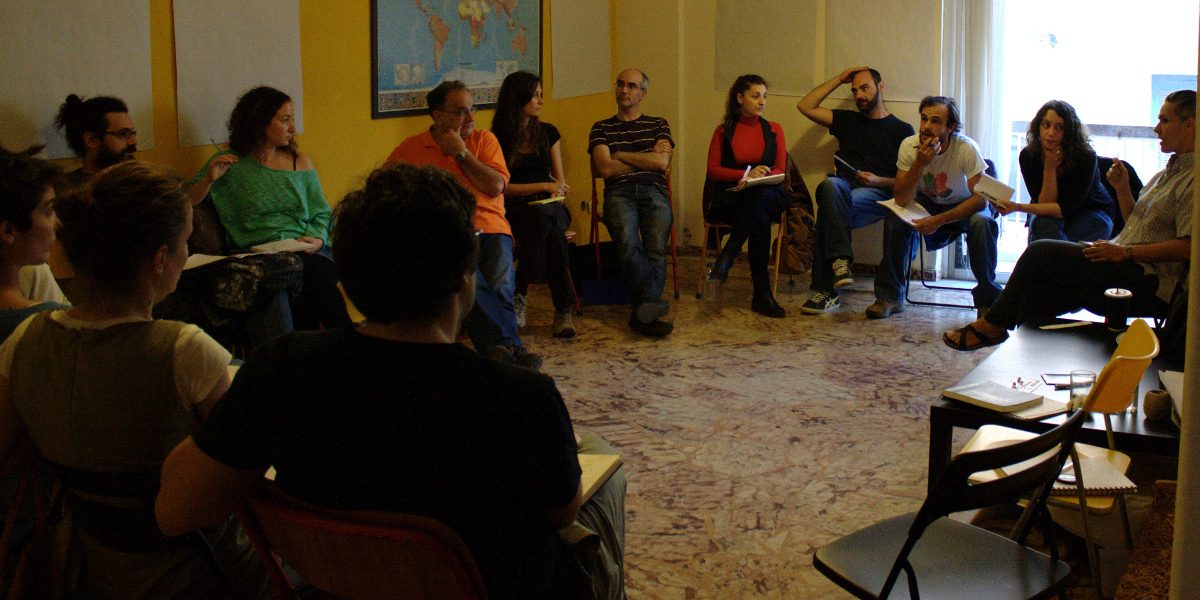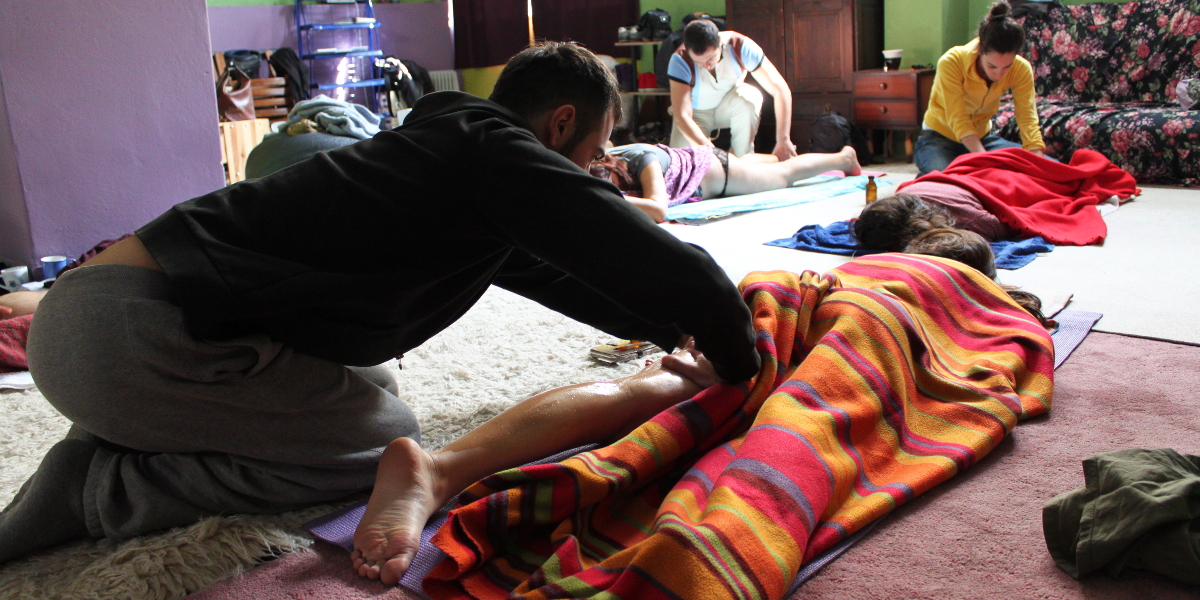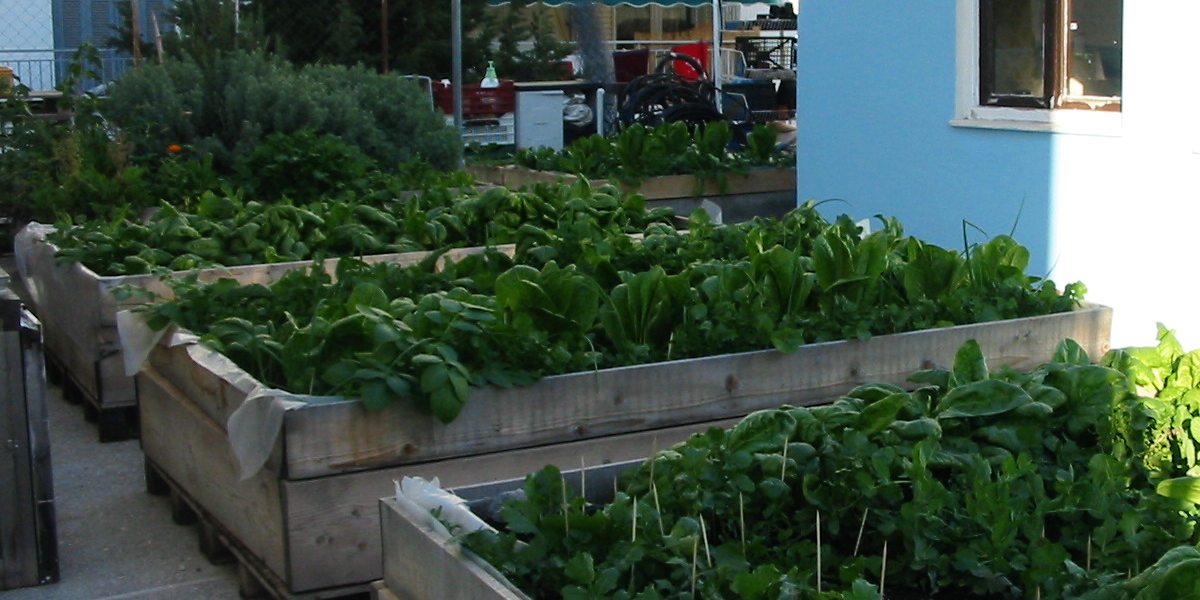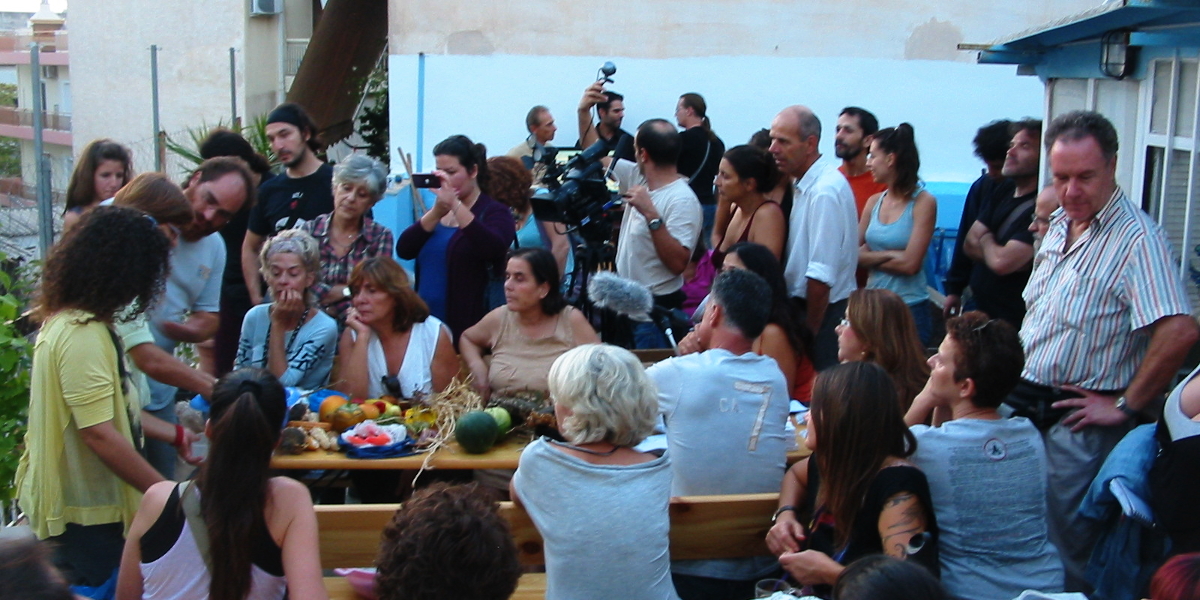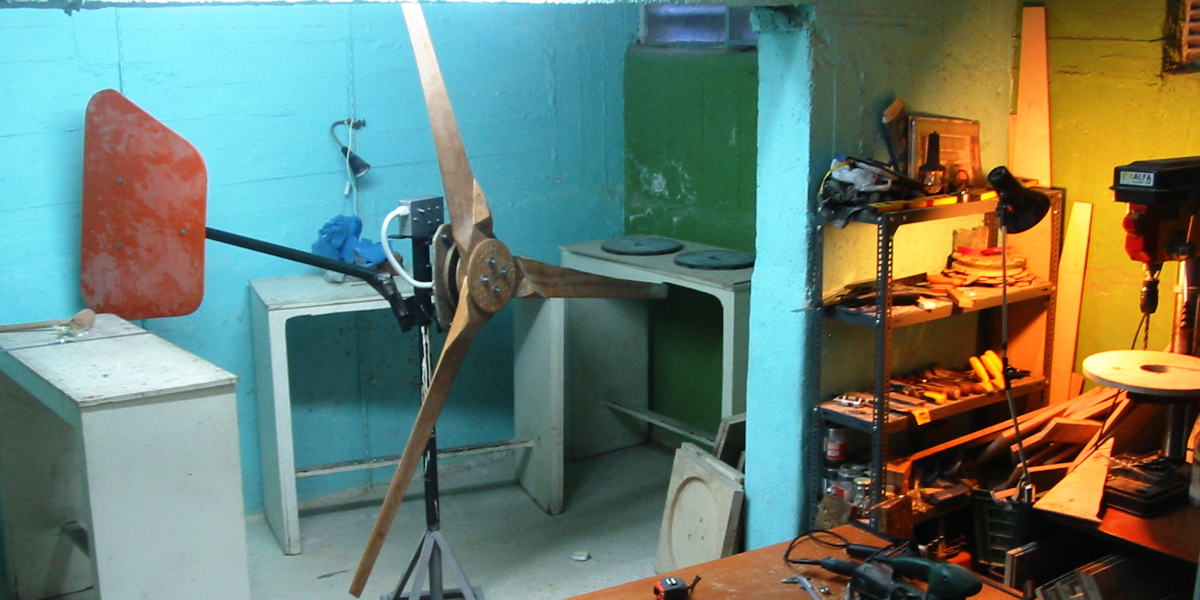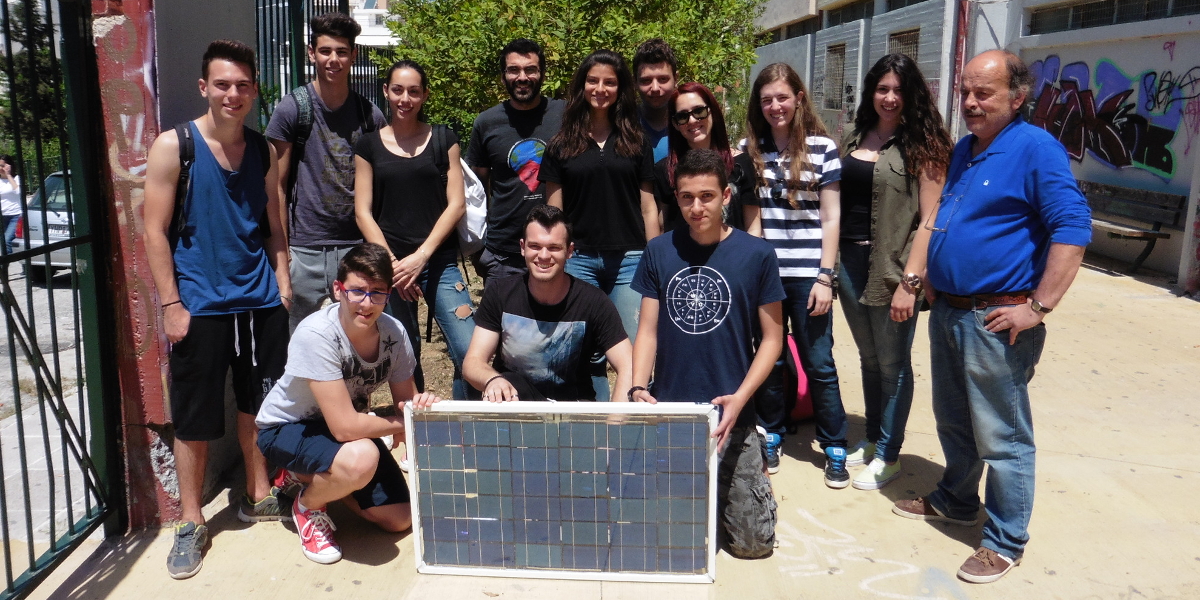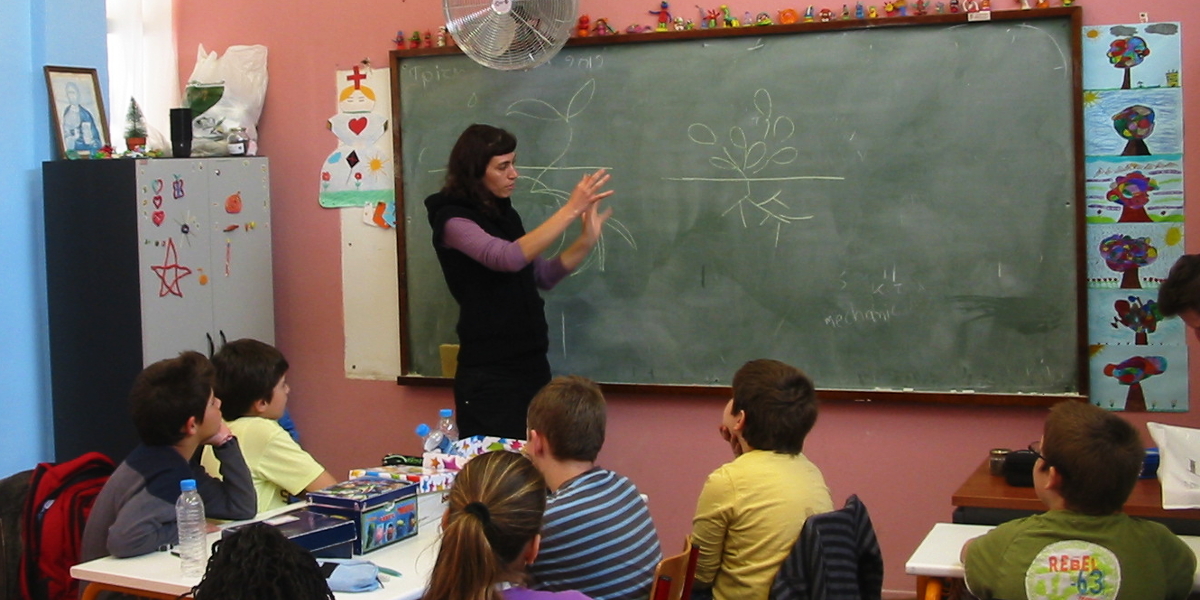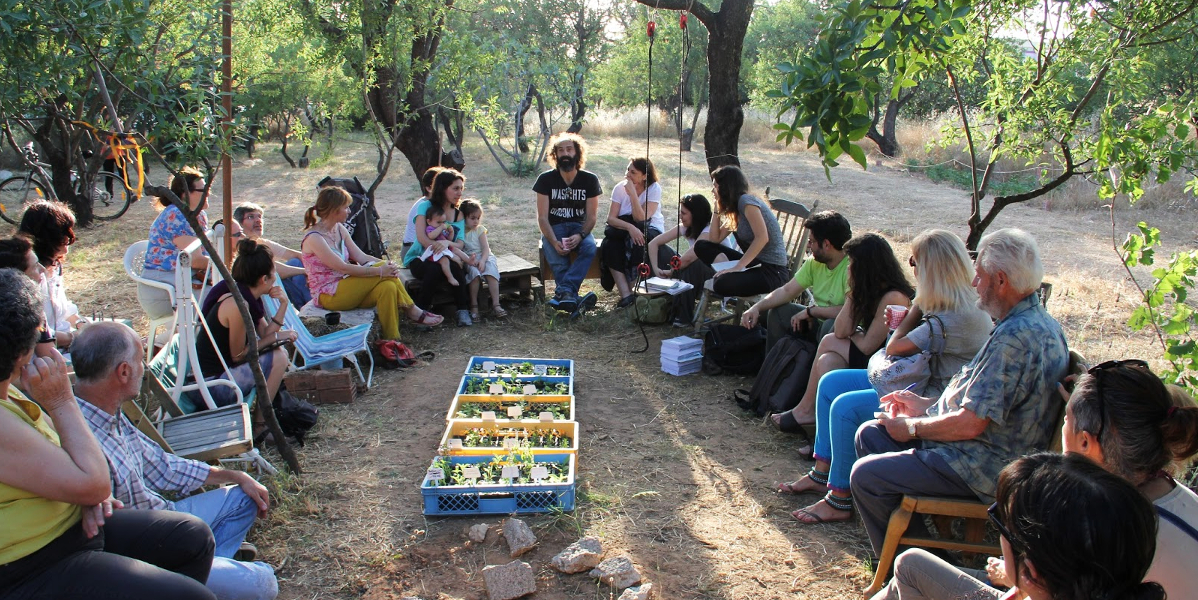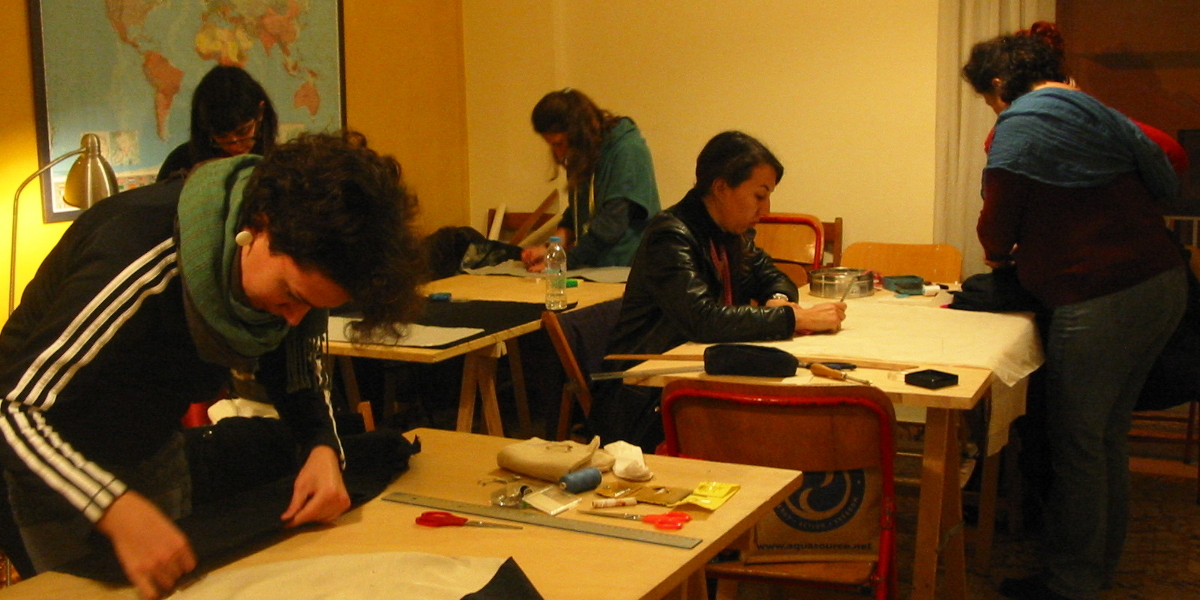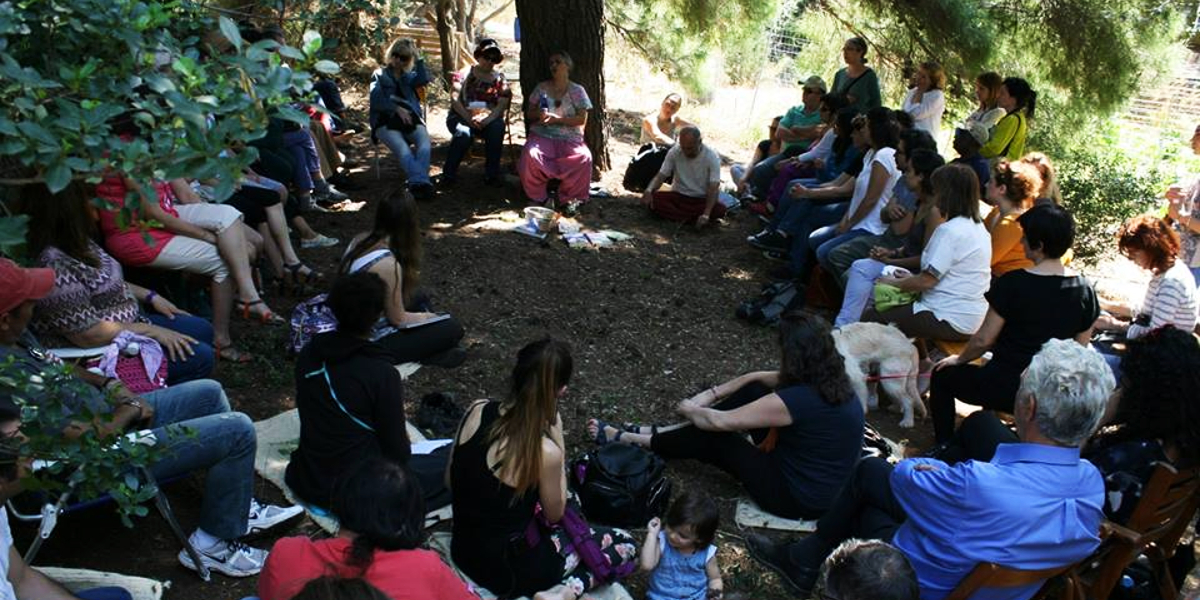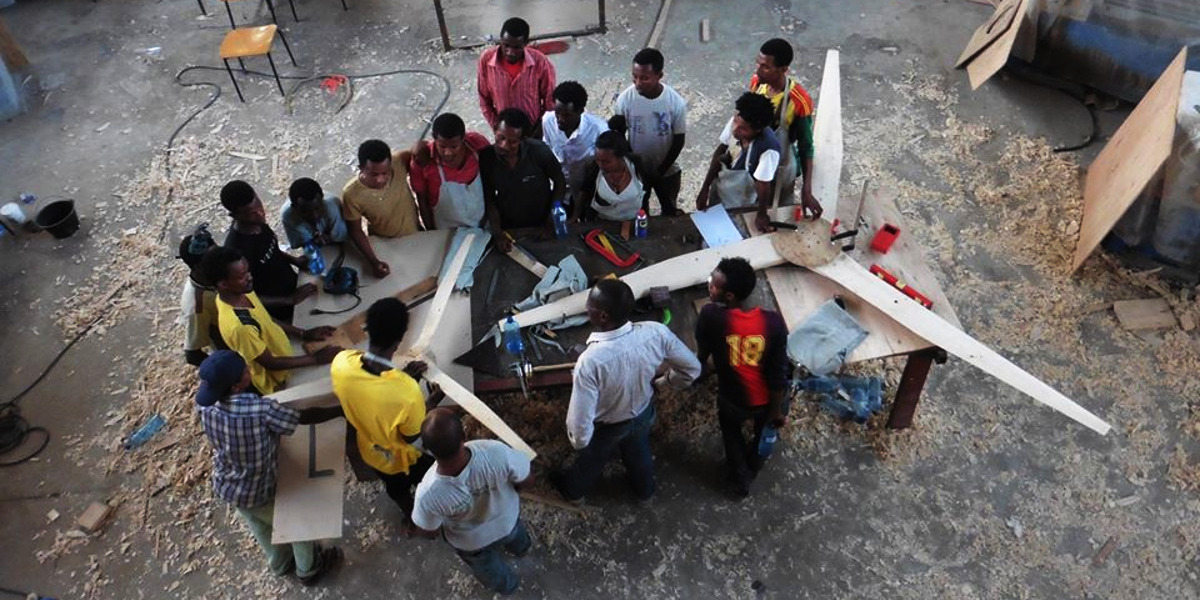Our story
Step One: New Guinea in Athens ‘The Seed Sprouts’
The ‘New Guinea’ project was launched in Athens in September 2009 with the aim of creating a centre for the ‘self-management of everyday life’. A two-storey house in Ag. Artemio Pagrati, was transformed within a year into a space for workshops and practical applications for self-management of energy, health, food, clothing and building in urban conditions.
With the initial aim of the home self-sufficiency economy, the workshops that operated on site developed practical skills and theoretical understanding of a variety of applications that empowered participants with useful knowledge that they could immediately apply at home. From the production of electricity with photovoltaic panels to the production of organic vegetables on the rooftop and from the production of herbal medicinal preparations to the sewing of handmade clothes and thermal insulation with natural materials, the self-management workshops tried to cover a range of topics and applications, so as to explore in practice the idea of home economics in an urban environment.
The workshops operated throughout the week and had an educational character, either in the form of two-day self-contained seminars every weekend, or three-month weekly courses, which made up a varied daily programme. The laboratories were distributed throughout the building alongside many practical applications of electricity production, herbs, vegetables and special areas such as the alternative therapies area and the preparation of therapeutic and cosmetic preparations. Specifically, in the basement of the building was the energy laboratory, where practical workshops were held on the construction of small wind turbines, photovoltaic panels, small hydro-generators and solar ovens, as well as any construction needed for the project. On the ground floor was part of the health laboratory, a large open space for conducting physical classes and alternative therapies such as Thai massage, yoga, Chinese medicine, acrobatics and more. On the first floor, there was a presentation and reception area, the clothing workshop with infrastructure for sewing and pattern making classes, the alternative therapies area for individual appointments with various therapists, the herbal therapy laboratory with the relevant library and packaged herbs, and the kitchen which was used as a preparation room for natural cosmetics and soap, for food processing and for the brewing of home brewed beer.
Alongside the workshops, there was a solidarity trade area with products from small producers and a clothing bazaar on the roof of the building. On the rooftop was the New Guinea practical applications area. The terraced garden consisted of large wooden beds that produced seasonal vegetables of local varieties and many herbs, while on the roof of the roof handmade photovoltaic panels and a small wind turbine produced electricity for part of the building’s needs. The thermal insulation of the roof had been reinforced with natural building techniques, while next to it handmade composting bins were filled with the organic waste from the kitchen. During the summer months, the roof terrace was used as a screening area and children’s events, but also as a café, the ‘Terrace Café’.
From 2010 to 2013, more than 30 different themes in the fields of energy, health, food, clothing and building were organised by 15 trainers who periodically worked with the project. Within these themes, more than 125 one-day, two-day and three-day seminars and 60 cycles of three-month weekly courses were organised. During these four years, we have had the honour of hosting more than 3000 people in the educational activities of the project, who have shaped the workshops with their participation and supported the project financially with their contributions.
The project has always operated with extroversion and aimed at networking with other projects in Athens and the provinces, but also at contacting people who had not been able to visit the site in St. Artemio. For this reason a multitude of actions outside the New Guinea building were in constant progress. A total of 40 open events on medicinal herbs and horticulture were organized in social spaces and solidarity projects in Athens, while practical workshops for children were organized in 15 schools, such as the construction of school vegetable gardens, the production of soap and cosmetics, the construction of photovoltaic panels, and many others. In the countryside, New Guinea organised more than 15 seminars on various themes and in collaboration with local solidarity projects, while it participated in the annual national and local Ecological Agriculture Festivals all over Greece and in dozens of political festivals such as the Anti-Racist Festival in Athens and Thessaloniki.
We also tried many times to reflect on our action together with the people who participated in the workshops in New Guinea and that is how the two-day festival on the Home Economy of Self-Sufficiency came about: “Everyday Stories of Self-Management”. The main objective of the festival was to highlight the applications that had sprung up in various places in Athens and in the provinces by those who had participated in our educational activities and to get to know all these people with the hope of further collaboration. During the two-day event, there were presentations of courses and practical workshops on the different themes of New Guinea, as well as an exhibition of photographs and products from the efforts of various people in urban farming, soap making, food processing, herbal medicine, sewing and more.
In June 2013 and after four years of operation, the New Guinea site in St. Artemio Pangratio has come full circle, as we felt that it had largely achieved the goals we had set for this project from the beginning. In many places on this website you can find photos, posters, videos and descriptions of everything that happened there during those four years.
Step two: New Guinea in Nea Makri ‘Transplanting to a larger pot’
Trying to ground many of the projects that were evolving in the Pangrati area, in June 2013 we decided to transplant the Nea Guinea project to Nea Makri, in an old olive grove of four acres. The main reason for the transfer was the desire to explore a new situation, this time not in urban conditions but in a peri-urban environment, where there was more contact with nature, we could rely more on the natural resources of the place and we had the opportunity to apply certain practices on a larger scale such as the cultivation of herbs and vegetables, renewable energy sources, natural building and many others.
Already since the autumn of 2011 we had started the regeneration of the field in Nea Makri with a series of open events and activities such as natural sowing with clods to improve the quality of the soil and the planting of fruit trees with the help of Panagiotis Maniki from the Centre for Natural Cultivation in Edessa. The work in the field continued with various constructions of the natural building workshop, such as the building of a warehouse using straw bales for the walls and a wood oven using the cob technique, for the construction of which we collaborated with the Saligaros team. In the spring of 2013, the first large vegetable garden of the field was opened, with the help of many volunteers and organic farmer Kostas Tsigou from the local Peliti Peratia group in Lefkada, while a few months later the herb garden with hundreds of medicinal herbs was planted. The Nea Guinea Project officially moved to Nea Makri in the summer of 2013 and during the following year created a hospitality infrastructure consisting of dormitories, camping areas, kitchen and other common areas, which enabled the project to accommodate up to thirty people during the conduct of multi-day training seminars or volunteer programs.
This infrastructure enabled the project to further develop its educational activities, this time with participants from abroad. Since 2014, multi-day seminars in English, with participants from many parts of the world, have been organized in the broader theme of permaculture and specific topics such as renewable energy. So far, three week-long seminars on small wind turbine construction have been hosted, a two-day agroecology seminar in collaboration with Terre et Humanisme from France and a two-week PDC (Permaculture Desing Course) with Rosemary Morrow from the Blue Mountains Permaculture Institute in Australia and Tina Lyberis. Alongside the training seminars, volunteer work weeks are organized during which Greek and foreign volunteers (from the WWOOF and HelpX networks) are hosted to contribute to the work that is going on in the field at that time, while using the hospitality facilities for accommodation and food.
In the context of New Guinea’s networking with organizations and projects in Greece and abroad, we have launched since 2013 a series of diverse activities that include the organization of training seminars abroad, the co-organization of conferences and events, participation in international networks and conferences, as well as our physical presence in communities and farms abroad. In September 2013, New Guinea travelled to Spain to participate in the Permaculture Trainers’ Seminar organised by Rosemary Morrow. During 2014, New Guinea co-organized in Athens the international conference of the Wind Empowerment Small Wind Turbine Manufacturers Network in collaboration with the Rural Electrification Research Group (RURERG) of NTUA. New Guinea has been involved in the Wind Empowerment network since its inception in 2011, and had since travelled many times to training meetings and renewable energy installations overseas, including many trips to Scotland to work with network members such as Hugh Piggott at Scoraig. In the same year, New Guinea participated for the second time in the 4th International Degrowth Conference for Ecological Sustainability and Social Equity, which took place in Leipzig, Germany, with a presentation of the energy workshop and practical workshops on herbal medicine, while it also participated in the pan-European GROWL project for the training of trainers on degrowth issues. In June of the same year New Guinea participated in the Radical Herbalism Gathering in England where our work in the field of Herbalism was presented, while in October we participated in the seminar on regenerative agriculture with Darren Doherty in Agia Fotia, Crete. During 2015, New Guinea travelled to Ethiopia, where, in collaboration with the Wind Empowerment network, it co-organised three training seminars on the construction of small wind turbines and completed two installations of stand-alone systems for the electrification of rural communities. In the same year, New Guinea was selected for a two-month subsidized internship at Richard Perkins’ permaculture farm in Sweden, which deepened holistic farm management, while in October 2016, New Guinea was selected for a subsidized participation in a ten-day landscaping workshop on water retention in the Tamera eco-community in Portugal. In September 2016 New Guinea participated in the international project SUSTRARES (Transition, Sustainability, Resilience) organized by the Sunflower Seeds network in Vlachia Evia, with the organization of workshops on energy, herbal medicine and composting, while in November 2017, New Guinea participated in a rural electrification project in Nepal, where, in collaboration with local organisations, it organised training seminars on the construction of small wind turbines and carried out the installation of an autonomous system to electrify a rural clinic.
In order to strengthen networking activities in Greece, New Guinea started in 2015 the organization of two festivals with a periodic character. Specifically, in May we organized the first Herbal Therapy Festival at the estate in Nea Makri, bringing together different remarkable individual and collective projects from all over Greece with the aim of highlighting through a series of practical and theoretical workshops the basic principles of herbal therapy and the possibilities it offers for self-management of health at a basic level in our daily lives. Then, in December, we organized the first ‘Life Celebration’ Festival with the aim of bringing together many small producers of organic products from all over Greece and solidarity projects, to promote the ideas and practices of a sustainable lifestyle based on solidarity and cooperation. To date, three ‘Life Feast’ festivals have been held at central venues in Athens (Quilombo, Technopolis Athens and the Association of Greek Archaeologists) that include an exhibition and sale of ecological products, presentations, informative events and practical workshops, accompanied by musical and theatrical performances and activities for children.
In recent years the project has been focused on the creation of a Permaculture Training Centre for Permaculture, while at the same time it is in the process of obtaining a Diploma in Permaculture from the Permaculture Association of England, which will allow us to organise certified Permaculture Design Course. The New Guinea farm is designed according to the principles of Permaculture and is a field of application and experimentation for the study, development and adaptation of different techniques in a Mediterranean climate. The design includes different polyculture systems, water collection and management systems, living hedges, composting and wastewater management systems and infrastructure to support educational activities. The farm produces food, herbs and timber to meet the basic needs of the people involved in its cultivation and also supplies the New Guinea kitchen during the seminars. Thus, it is an open classroom for the practical workshops organized in the context of the relevant seminars, while it also hosts open information events and guided tours.
